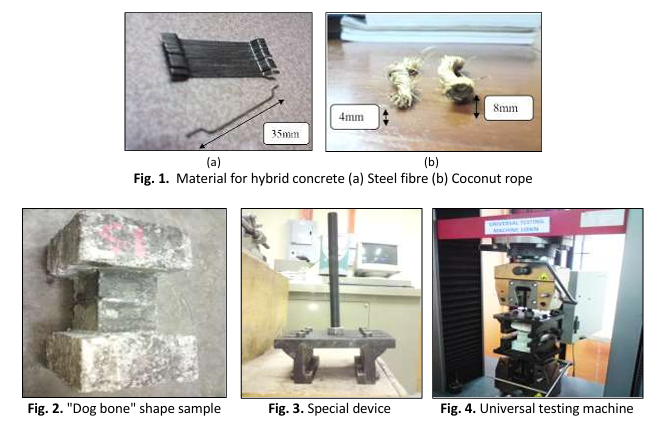Enhancing Direct Tensile Strength: A Study of Hybrid Steel and Coconut Rope Fibres in Reinforced Concrete
DOI:
https://doi.org/10.37934/ard.130.1.93100Keywords:
Hybrid concrete, steel fiber, coconut rope, direct tensile test, energy absorptionAbstract
Enhanced matrix packing density and tailored fiber-to-matrix interface bond properties have led to the recent development of fiber reinforced concrete with improved material tensile performance in terms of strength, ductility and energy absorption capacity. Concrete is strong in compression but weak in tension. Adding two or more type of fibers into concrete and become hybrid fiber concrete which can solve this problem. The aim of this study was to investigate the use of coconut rope to be hybrid as fiber with steel fibers. In addition, this study also analyzed the differences between hybrid fiber concrete and concrete without hybrid fiber in the direct tensile test. For direct tensile tests, the size of specimens in the form of "dog-bone" was 60 × 100 × 60 mm. Seven samples were prepared for this study. The hybrid concrete sample consists of steel fiber and coconut rope. Total volume fraction of steel fiber and coconut rope were kept to 2% but the volume fraction of steel fiber and coconut ropes were each different, such as 2.0-0%, 0-2.0%, 0.4-1.6% and 1.0-1.0%. In addition, the concrete containing 1% steel fiber and 1% coconut fiber rope had a direct tensile strength 1.36 N/mm2 and this value was near to the value of the direct tensile strength of concrete containing 2% steel fibers, 1.64 N/mm2. Their difference was 17.1%. The CS3 and CS4 specimens which included 1% steel and coconut ropes, exhibited the maximum energy absorption. It was observed that CS3 and CS4 specimens were more ductile. These results showed that this hybrid fiber concrete could contribute both tensile strength and energy absorption similar to steel fiber concrete. Moreover, hybrid fiber reinforced concrete can produce greater tensile strength and energy absorption capacities.
Downloads























